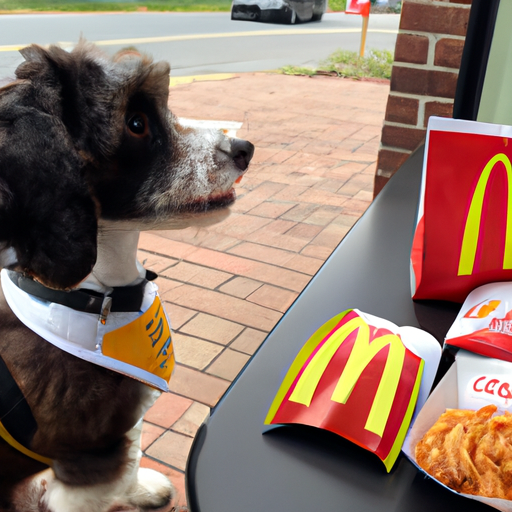You’ve just come back from a long day out and you’re hungry. You know your furry friend is too. You think about the golden arches of McDonald’s and wonder, “Is there anything safe for my dog to eat there?” The answer is yes, but with caution. Here’s a guide to help you navigate the McDonald’s menu for your canine companion.
H2: The Golden Rule of Dog Feeding
When it comes to feeding your dog, the first rule is moderation. While it’s okay to treat your dog to some fast food once in a while, remember that their regular diet should consist of high-quality dog food. McDonald’s food is processed and contains high levels of sodium and fat, which can lead to obesity and other health problems if consumed in large quantities. Therefore, any food from McDonald’s should be considered a treat and not a meal.
H2: Safe Choices
There are several items on the McDonald’s menu that are safe for dogs in small quantities. Here are some options:
-
Plain hamburger: This is a safe choice for dogs. Make sure to order it plain, without any sauce, cheese, onions, or pickles.
-
Grilled chicken: Chicken is a good source of protein for dogs. Remember to ask for it without any seasoning or sauce.
-
Scrambled eggs: These can be a great source of protein. However, they are often prepared with butter and oil, so they should be given in small quantities.
| Safe Choices | Notes |
|---|---|
| Plain hamburger | No sauce, cheese, onions, pickles |
| Grilled chicken | No seasoning or sauce |
| Scrambled eggs | Give in small quantities due to butter and oil |
H2: Foods to Avoid
Just as there are safe options, there are also several items on the McDonald’s menu that are harmful to dogs. These include:
- Anything with onions or garlic: These can be toxic to dogs and cause anemia.
- Chocolates: These are toxic to dogs and can cause vomiting, diarrhea, and other severe symptoms.
- Coffee and other caffeinated products: These can be dangerous for dogs, leading to restlessness, rapid breathing, heart palpitations, muscle tremors, and fits.
- Grapes and raisins: These can cause kidney failure in dogs.
H2: Potential Health Risks
While the occasional McDonald’s treat won’t harm your dog, frequent fast-food can lead to obesity and other health problems. These include:
- Heart disease: High-fat foods can lead to obesity, which in turn can cause heart disease in dogs.
- Pancreatitis: This condition can be caused by eating fatty foods.
- Diabetes: A high-fat, high-sugar diet can lead to diabetes in dogs.
- Gastrointestinal issues: Dogs are not designed to digest processed food, and frequent consumption can lead to vomiting, diarrhea, and other digestive problems.
H2: FAQs
Q: Can my dog eat McDonald’s fries?
A: While not toxic, fries are high in fat and sodium, which can lead to health problems if consumed regularly. It’s best to limit your dog’s intake.
Q: Can my dog eat McDonald’s nuggets?
A: Chicken nuggets are not recommended for dogs due to their high fat content and the seasoning used, which can be harmful.
Q: Can my dog eat McDonald’s cheeseburgers?
A: It’s best to avoid cheeseburgers as they contain onions and garlic, which are toxic to dogs.
Q: Can my dog eat McDonald’s ice cream?
A: Small amounts of vanilla ice cream are generally safe for dogs. However, be careful with the sugar content and avoid any with chocolate.
Remember, when it comes to feeding your dog, nothing beats a balanced, nutritionally complete dog food. Fast food should only be an occasional treat and not a regular part of their diet. Always consult your vet if you have any concerns about your dog’s diet.



